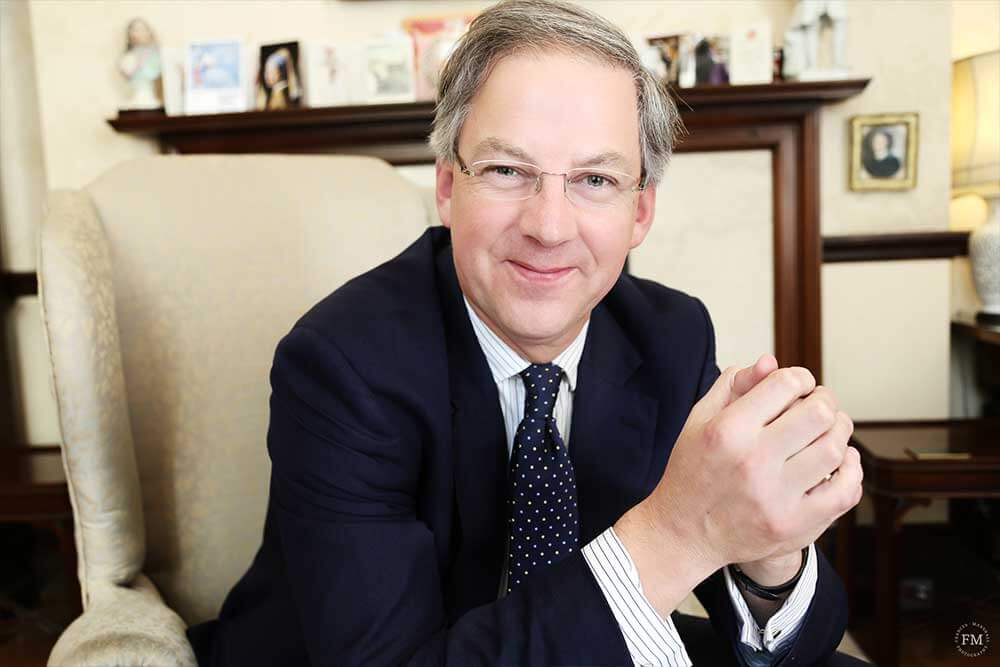AN INTERVIEW SERIES WITH JONATHAN FREEMAN-ATTWOOD, THE PRINCIPAL OF THE ROYAL ACADEMY OF MUSIC
Part 1 – the trumpet and the early years
Why the trumpet? What made you choose this instrument?
I grew up in a fairly musical family. I’ve got an elder brother who’s a very good violinist and pianist, and he, as well as my father, were wonderful influences in how they introduced me to music. There was music around the house all the time, in one shape or form.
The trumpet? It was just one of those serendipitous occasions: I picked a hunting horn at my grandmother’s house when I was about 10, a reasonable sound came out and I thought ‘this is quite fun’! A family friend in the next village revealed had a trumpet (in fact the lovely English tenor, John Elwes) which was broken in about 15 different bits, probably vandalised after he realised it was harder than singing! My father put it together with string, and I never looked back really. I found it was something I could do, something I really enjoyed doing and getting better at.
Thinking about it now, I was reasonably ‘unreflective’ about it – I suppose very young people are generally unreflecting to a certain extent when it comes to the process of learning something? Instead they gently follow their instincts, get into good habits and bad habits, and then teaching comes in and tries to ‘refine’ the good ones and erode as many of the bad ones as possible.
The first time I realised, though, that I was on a journey as a trumpet player was through the ABRSM grading system, which suited me because it set goals that I felt were attainable. I’ve always been quite an organised person – being able to work out what I was going to do over the course of the day – so I was methodical in preparation, though I don’t think that made me a particularly interesting musician.
I think that one of the things I was really lucky to have when I grew up, was a very ‘articulate’ environment: people wanted to talk and express their views and impressions of music, and what they were experiencing when listening or playing. My mother was a poet as well, so it was an open free-wheeling and expressive environment in which music slotted in very naturally.
For this reason, I started to get interested in the expressive world of music making and what it is that ‘governs’ a convincing interpretation, even if I consistently failed miserably. I think that developed quite early with me, much earlier than my technical capabilities on the instrument.
Did you start with the ABRSM grading system from your very first year of playing, or was it something that you did later on?
I believe the trumpet started then in Grade 3. So yes, I started quite quickly, and got to the exam in the first 18 months or so.The thing with the trumpet is, if you’ve got a good, natural set-up, you can get going quite fast. Brass instruments are generally good in that way; it’s a faster progression in the earlier stages, in many ways, than with many other instruments.I should point out, though, that I view early-learning experience with enormous humility, because I know the expertise that goes into great teaching – GREAT teaching – in the early stages. It’s an incredibly skilled art. I have the utmost respect for people who do it at the level they do, with the patience, the wisdom and the imagination. I’m afraid I don’t have any of these skills and so I’m in awe of how it happens. But I will be bold enough to say that on a brass instrument, if you’ve got a good embouchure and you know how to breathe and think in parallel, you can get to Grade 3, 4, and 5 pretty fast.
Did you learn any other instruments?
Yes, a bit of piano. I am a very functional pianist – pretty industrial actually – which means, fairly limited! I can get around stuff in a very basic sort of way, but I wouldn’t be able to accompany you on the Franck Violin Sonata (!) though I could see through things which are not particularly testing.
Would you tell us something about your first teacher?
One of the most inspiring things about an early experience with a teacher is when they play. I would say ‘please, can you play something, please?’ He was quite a modest guy and he didn’t want to show off but I was, in fact, keen that he did show off. I never forget him playing the Bach Christmas Oratorio at a time when I was still playing fairly limited stuff, and certainly not able to ping out a top G, let alone a D, with any great venom, but he – he just played it brightly and fabulously! And I thought ‘God, if I could play like that one day that would really be something to aim for’.
So, at the end of every lesson he would always give me a little demonstration of what he was learning – orchestral excerpts, a study or anything like that. He was a model peripatetic teacher in his general example and supportive-ness but didn’t really know how to convey teaching in words. He was a natural whom you tried to imitate but without a strategy to make you technically better.
Does a good player make a good teacher?
No, I don’t think the best players are necessarily the best teachers. I remember my second teacher, who was not such good a player, but he was a far better teacher, and I learned much more from the him.
Why do you think that is?
Well, all of us are very different in the way in which we divide up our ‘box of skills’. We often develop an interest at the expense of something else. It doesn’t always have to be this way – but there are only so many hours in the day, only so many ways in which you can pursue your interests at a level that makes you feel fulfilled. For my second teacher, his working out in detail how to make others better was his over-riding passion. So, did you want to take the trumpet as far as possible? It’s a hard question because I have never, in my life, ever been solely a trumpet player. I wanted to be as good as possible but I had lots of other interests at university and afterwards, as writer, producer, broadcaster and so on. As it happened, the symphony orchestra world passed me by completely. Most of my playing was chamber playing, my own solo work which I did off my own back with pianists and organists, and some baroque trumpet. It was quite a narrow little corridor of activity, but I knew that I want to keep it like that, and not do too much. In that way, I look back and think of all the programmes and ‘re-imaginings’ I’ve concocted. I’ve recorded over ten solo discs and I’m proud, above all, that I’ve shaped them in a way that has stirred my passions and played to my strengths.
So, it’s a career is matter of choice?
Yes, it’s a matter of choice – up to a point. And that goes for all the subtle and changing ratios of time spent between teaching and performing. But circumstances (i.e. how your work is assessed by your peers and what work you’re subsequently offered) affects how many of your priorities can be realised at any one time.
I say to students that ‘there are as many professions as there are professionals’, and I do passionately believe that. Nobody has forged a career quite like I have, and nobody has forged a career like you’re forging. Everybody has a uniquely nuanced way in which their professional life unfolds.And a lot of it comes down to the intersection between lifestyle and professional choices.
Some might say ‘I play the clarinet in Les Misérables, and that’s my profession. After that I don’t give it a thought, I don’t give music a thought. I’m actually interested in gardening, or reading, or walking. I’m interested in whatever…’.
But there are other people, like me, who cannot exist happily without a musical idea, passion or an interest bubbling away all the time. That’s what drives me. The fact that I think rather obsessively about music makes working at the Royal Academy of Music quite a dream really! It’s what you have around you, all the time.
Going back to the teacher question, I think that some people find they reach a certain level as players, and they feel that they can’t, or haven’t got the will, to take it further. It’s not just about courage and it’s not just about ability. It’s about where they want to focus their energies – and they find that they have this hypnotic way of getting the best out of others.
That’s what teaching is about, isn’t it? It’s about identifying how to get the best out of others, and finding solutions, and always looking at ways in which you can develop your own interest in teaching at the same time.
I am always very conscious of the music educator Paul Harris’s thinking on this. He talks a lot about a
concept called ‘simultaneous learning’, which is a bit like the elephant in the room and before I read
his book I never really thought about it. ‘Simultaneous learning’ is the approach which means that
when you’re interacting with someone who’s learning, your mindset is one of mutual discovery and
learning. The dynamic is not merely one of one-way delivery by the ‘master’. I bet that Bach was like
that, and he really was the master!
If you’re teaching somebody, say, a Grade 4 pianist, and you’re engaging with that pupil on a piece, and you discover something about that piece through teaching it, that actually helps you understand and grow as a musician. The whole process of interaction is inevitably going to be on a higher level. Because once the pupil feels the confidence that what they’re doing is affecting the teacher in a positive way, it provides an incredible sense of elevation for the pupil. I remember feeling a huge
sense of pride when I was about 16, and I came down and had a lesson with the person who was to be the head of brass here at the Academy, Jim Watson. I remember going to his house in Watford, and playing something, and doing it in a certain way, and he said ‘Gosh, I love the way you do that, I’ll remember that when I’m playing it next at Covent Garden’. Can you imagine how that made you feel?!
That sort of thing empowers the student hugely because they feel that someone is taking them seriously, as a kind of collaborator in the process of endless growth.

